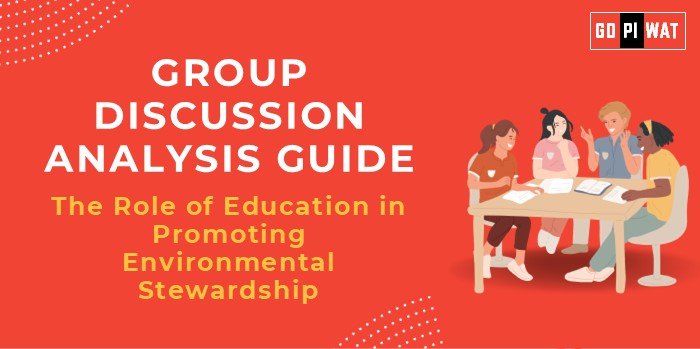📋 Group Discussion (GD) Analysis Guide: The Role of Education in Promoting Environmental Stewardship
🌐 Introduction to the Topic
- Opening Context: Education plays a pivotal role in shaping future generations’ attitudes and actions toward environmental sustainability, a necessity given rising global challenges like climate change, biodiversity loss, and pollution.
- Topic Background: Environmental education has evolved since the 1970s, when UNESCO first emphasized its global importance. In India, initiatives like the Environmental Education program under the National Education Policy 2020 aim to integrate sustainability principles into mainstream education.
📊 Quick Facts and Key Statistics
- 🌍 Global Carbon Emissions: Education campaigns could reduce emissions by 19 gigatons by 2050 (UNESCO, 2021).
- 📚 Youth Engagement: 70% of students globally recognize climate change as a crisis, but only 40% feel informed on actionable solutions.
- 🇮🇳 Indian Initiatives: Over 90,000 Eco Clubs established under the National Green Corps engage students in sustainability projects.
- 📜 Policy Alignment: NEP 2020 mandates climate literacy for schoolchildren, fostering long-term awareness.
🤝 Stakeholders and Their Roles
- Governments: Develop and enforce environmental education policies.
- Educational Institutions: Incorporate sustainability-focused curricula and extracurricular activities.
- NGOs: Partner with schools to run environmental awareness programs.
- Communities: Reinforce eco-friendly behaviors through localized efforts.
🏆 Achievements and Challenges
✨ Achievements
- 📖 Inclusion of environmental topics in Indian curricula has raised awareness among millions of students.
- 🌍 Global initiatives like Earth Day and Fridays for Future have mobilized young environmental activists.
- 🌱 Increased adoption of green practices, e.g., tree-planting drives in schools.
⚠️ Challenges
- 👩🏫 Lack of trained educators for teaching environmental topics effectively.
- 🏫 Insufficient infrastructure and resources for practical environmental learning.
- 🌍 Global Comparisons: Scandinavian countries lead with hands-on sustainability education, while others lag in implementation.
Case Study: Kerala’s Green School Initiative emphasizes experiential learning, involving students in biodiversity audits and waste management projects.
📖 Structured Arguments for Discussion
- ✅ Supporting Stance: “Education is a cornerstone for fostering environmental stewardship, equipping individuals with knowledge to tackle ecological challenges.”
- ⚡ Opposing Stance: “Without structural reforms and funding, environmental education risks being superficial and ineffective.”
- ⚖️ Balanced Perspective: “While education lays the foundation for stewardship, systemic changes and community involvement are equally essential.”
💡 Effective Discussion Approaches
📣 Opening Approaches
- 🌍 Begin with a striking fact, such as the potential of education to cut global emissions significantly.
- 🌱 Use a case study, like Kerala’s Green Schools.
🛡️ Counter-Argument Handling
- 🌟 Highlight resource limitations but propose feasible solutions like teacher training programs.
- 🌍 Emphasize global best practices and their adaptability.
🛠️ Strategic Analysis of Strengths and Weaknesses
- Strengths: Builds long-term awareness and creates actionable change at the grassroots.
- Weaknesses: Limited outreach in underprivileged areas.
- Opportunities: Integrate technology for wider access and foster international partnerships.
- Threats: Resistance to curriculum changes and inconsistent implementation across regions.
🔗 Connecting with B-School Applications
- Real-World Applications: Projects on corporate sustainability strategies or CSR programs promoting environmental education.
- Sample Interview Questions:
- “How can education catalyze environmental behavior change in corporations?”
- “What role do global collaborations play in environmental education?”
- Insights for B-School Students: Build expertise in designing sustainable business models and explore the intersection of education, technology, and sustainability.


